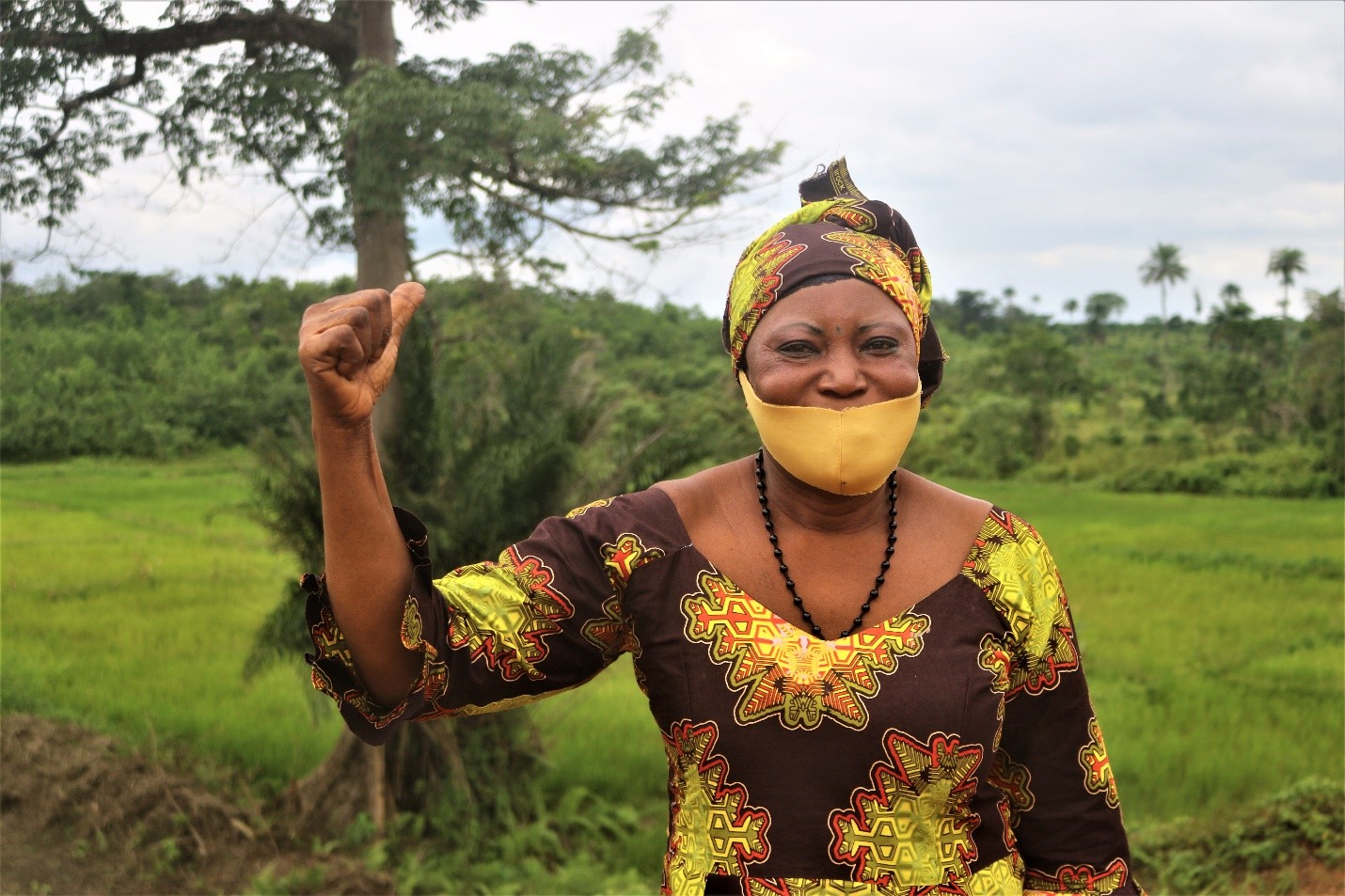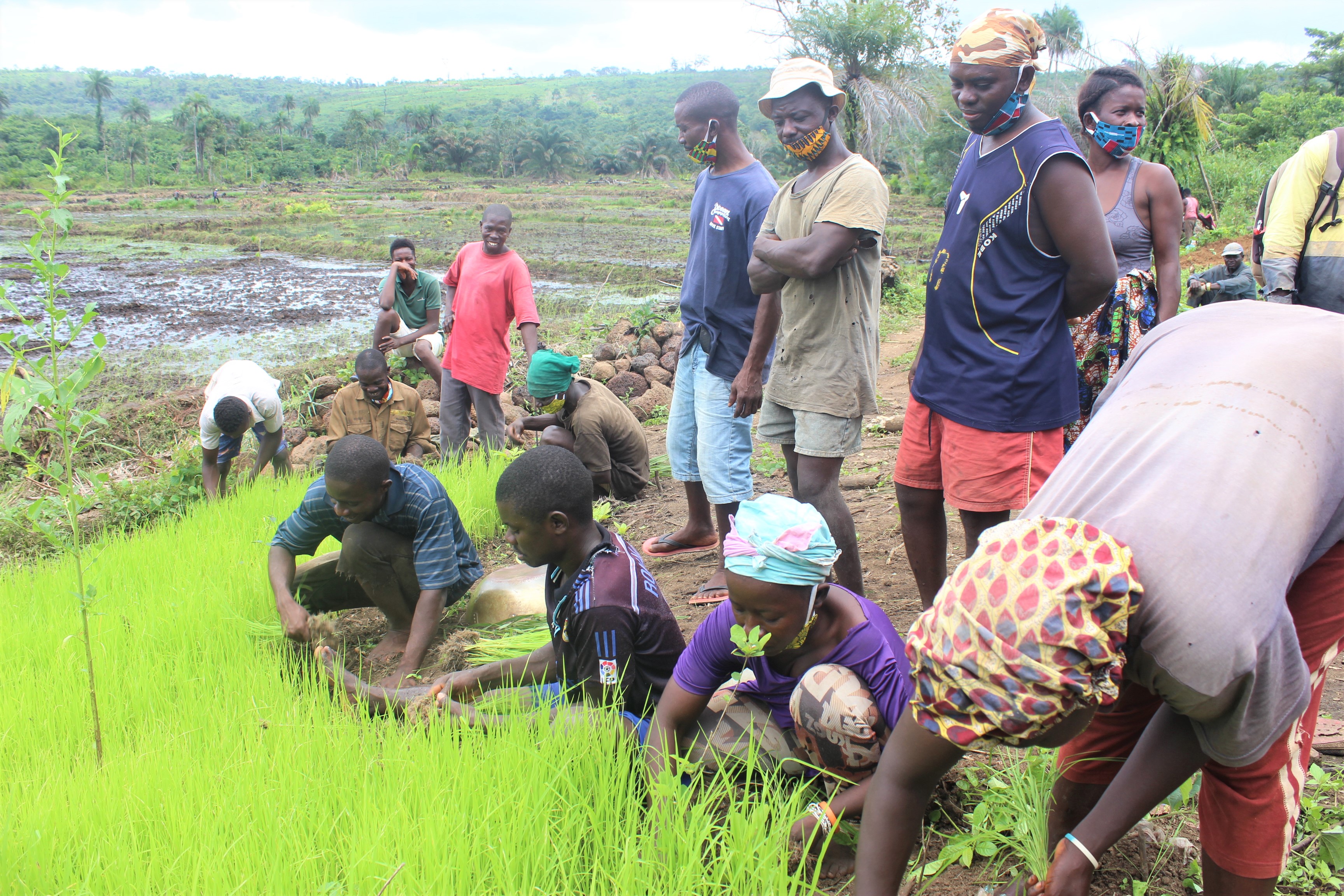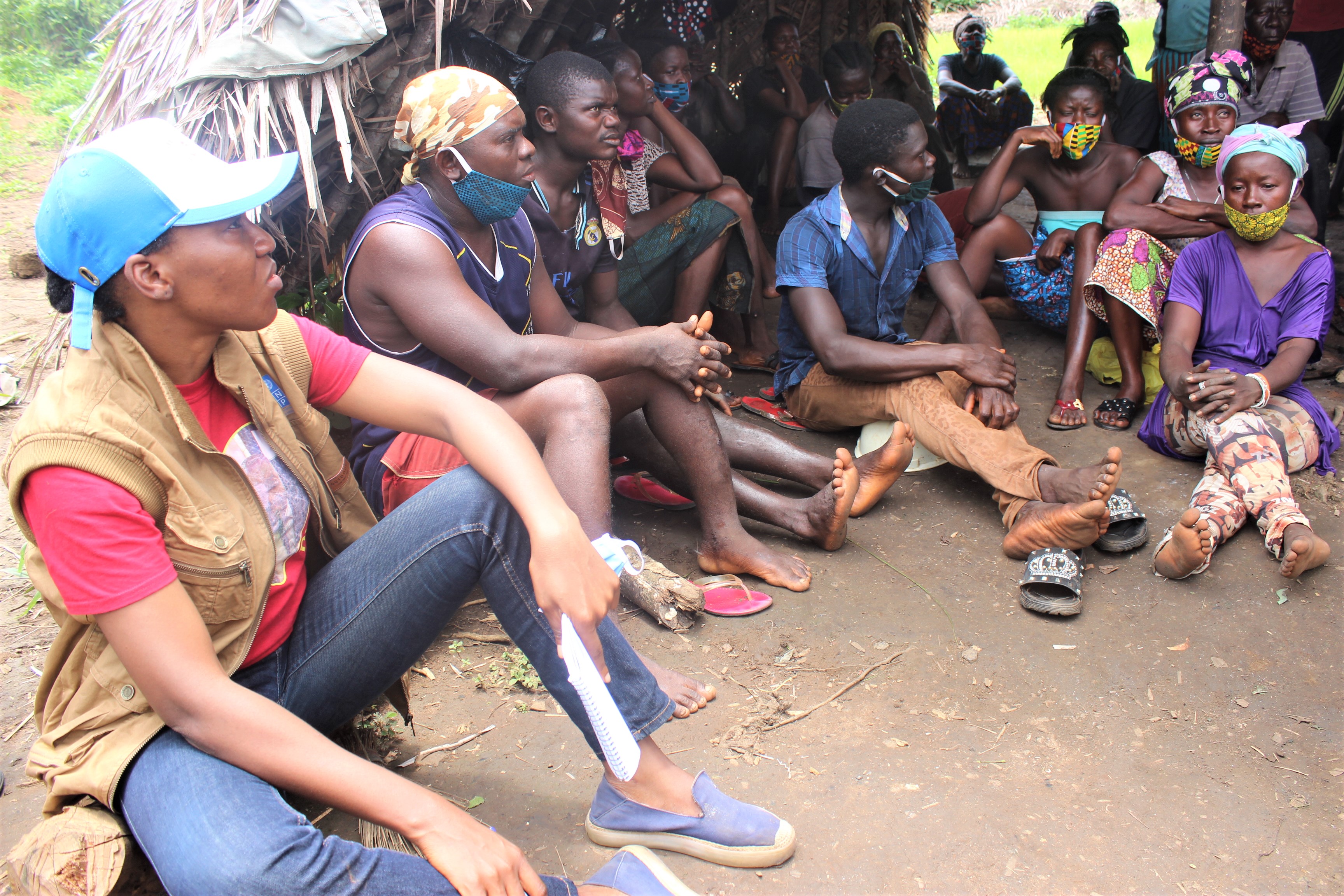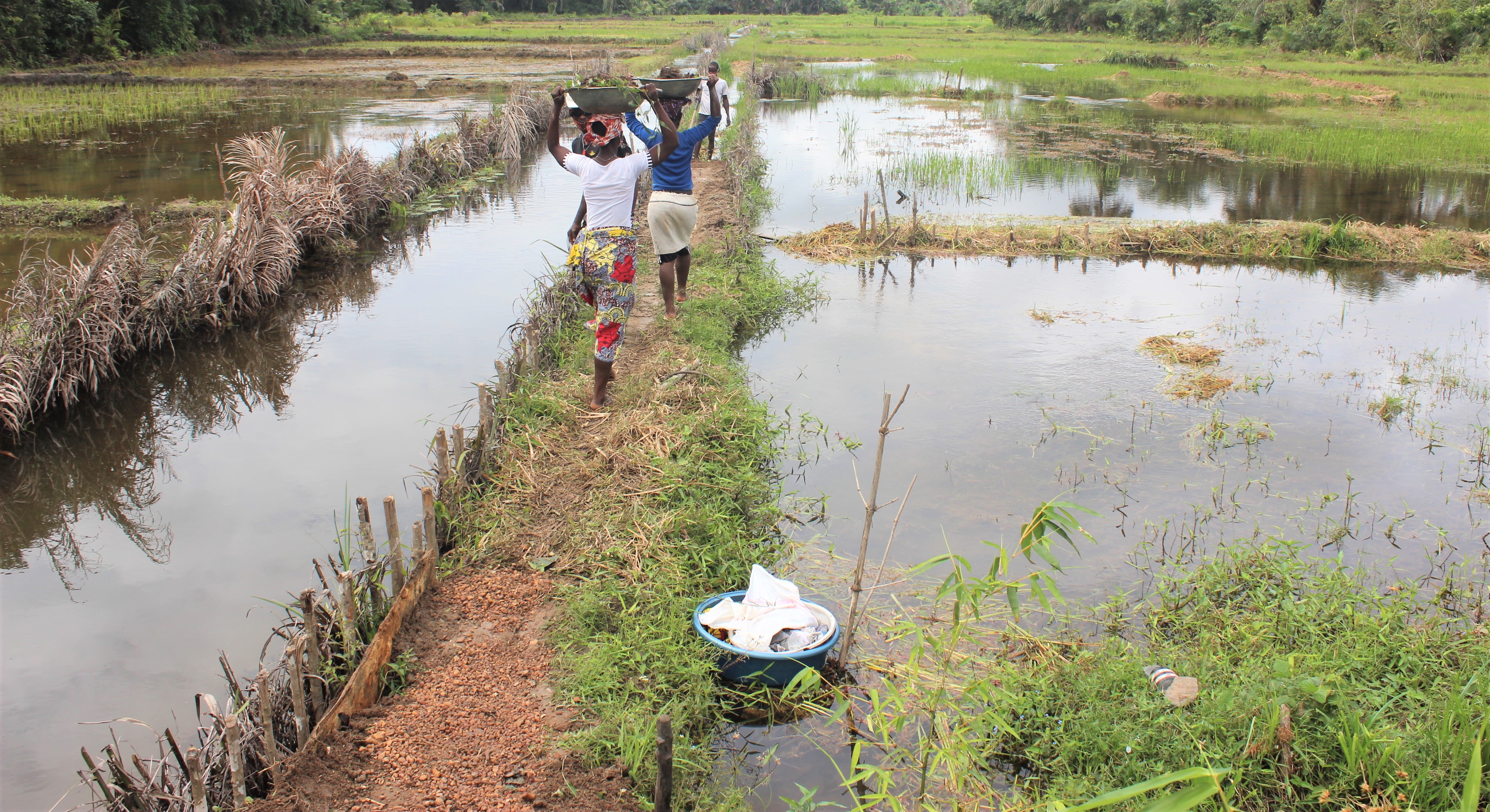Jitta Kanneh, Mammy Queen of Makpele Chiefdom, at one of the swamp-rice development livelihoods for peace initiative of the PBF project
For fostering Peace and Social Cohesion in Pujehun and Moyamba districts, communities score the Government of Sierra Leone, the United Nations Development Programme (UNDP) and the World Food Programme (WFP) over 80% in the Multi-Stakeholder Project supported by the Peacebuilding Fund (PBF).
Residents (youth, women, chiefs and other district and chiefdom authorities) of Malen and Makpele chiefdoms of Pujehun District and of Lower Banta and Upper Banta Chiefdoms in Moyamba district recently rated the Government of Sierra Leone (GoSL), UNDP and WFP Multi Stakeholder Platform (MSP) Project “over 80% successful” as a resource based and local conflict resolution mechanism that promotes peace and social cohesion. This finding was revealed by district stakeholders during a two-day spot-check visit to the project chiefdoms led by UNDP’s Resident Representative-Dr. Samuel Doe, where his team engaged with community members, local and traditional leaders of the areas to learn about the outcomes of the project.
“It’s almost one year now, we have not witnessed road blockades or any act of violence in the Pujehun District emanating from land related disputes or dissatisfied youth groups or a community member. We are grateful to UNDP and WFP and the Government of Sierra Leone.” -says Jitta Kanneh, Mammy Queen of Makpele Chiefdom.
Communities of Moyamba and Pujehun Districts share common socio-economic activities, and both districts are recognized for the abundance of natural-resource wealth hence experience a high level of operations by international large-scale mining and agricultural commercial companies. However, the two districts are among the poorest of the poor in Sierra Leone which ranks at the tail end of development globally. Based on this background and a history of war and under development, there have been frequent unrests between the communities and the multinational companies investing in the areas, as well as among communities and their local leadership.
Courtesy of the UN Peacebuilding Fund, “In Malen Chiefdom, the multi-stakeholder project is bringing all parties together. Community people are trusting each other again and the Grievance Redress Committees (GRC) is providing opportunities to discuss grievances, and stakeholders’ views are sought on how they would like community matters to be taken forward.” According to Chief S.R Moiguah, the Chiefdom Speaker for Malen Chiefdom.
The project was launched at the end of 2019, UNDP and WFP through the Government of Sierra Leone launched the “Mitigating Localized Resources-Based Conflicts and Increasing Community Resilience” project piloted in Pujehun and Moyamba districts. Prior to this project, findings showed that the two districts were characterized by violent social unrest and land conflicts and overall deteriorating relationships between communities and multinational companies investing in the large-scale agriculture and mining sectors in these communities. The project thus seeks to promote peace and social cohesion in these areas through a combination of peace dialogues, through grievance redress committees and community policing and by supporting sustainable agricultural as well as creation of income-generating opportunities for the people.
Some achievements of the project include the following:
Helping to ensure land acquisition and land use processes are more inclusive and aligned with policy frameworks. A Land Degradation Assessment completed by the Sierra Leone Agricultural Research Institute (SLARI) across the targeted chiefdoms and districts indicates significant forest degradation informed by indigenous perceptions in the four chiefdoms and backed by empirical evidence obtained from Landsat imagery analysed at 2000 and 2020. Forest loss is mainly attributed to the combined influence of local activities (subsistence farming, lumbering, and charcoal production); mining (in the case of Lower and Upper Banta); and expansions in oil palm plantations (more intense in Malen than in Mapkele). Indigenous perceptions suggest that the land tenure systems are highly monopolized by local authorities and compensations or surface rents are grossly inadequate to provide sustainable and alternative livelihoods after land dispossession. The attendant surplus labour, poverty and food insecurity have been major triggers of dissatisfaction and conflict in these communities. Moreover, Chemical analysis of water samples proved that water bodies in mining localities are more polluted than those in non-mining communities. Results from Malen showed that soil and water samples had higher pollutants than those in Makpele.
Supporting the establishment of effective stakeholder engagement and dialogue mechanism (landowners, local authorities, women and youths) in land tenure and in land deal negotiations, and sensitization on company operations. Employment opportunities for indigenes and the delivery of corporate social responsibilities are perceived by the communities as grossly inadequate in view of their expectations. Labour intensive and menial jobs are open to indigenes due, in part, to their lack of qualification for technical and administrative jobs that attract better salaries. Communities in operational areas of mining and agricultural companies complained of serious challenges in accessing social amenities like healthcare, education, and safe drinking water.
The project has implemented Multi-Stakeholders Platform (MSP) meetings in the two districts informed by feedback from the subcommittee set up by the MSP to follow up on challenges of target communities. Community grievance redress meetings and dialogues keep going on in the two districts.
The project also incorporates the livelihoods support approach for sustaining peace. Therefore, climate-smart agricultural practices are being maximized with high yielding rice cultivation taking place in 31 inland valley swamps managed by 31 Farmer Groups comprising of 588 females and 1,269 males who have also benefited from trainings in climate-smart agricultural practices, rice seeds, cash for work and farming tools all provided by the Peacebuilding Fund. This livelihood support is also giving assurance to food security whilst supplementing the districts’ popular root crops such as cassava and sweet potato.
A year later from the launch of the project, a joint team from UNDP and WFP led by the UNDP Resident Representative Dr. Samuel Doe visited the project sites and communities to assess progress. Indeed, community members attested that, the social unrests and resource based conflicts have significantly reduced that in the one year of the project’s implementation through the Local Civil Society – Fambul Tok, they have not experienced any violence conflicts but rather resort to dialogue for conflict resolution while investing time in the agricultural projects established by the project.
“Our recent field engagements with chiefdom stakeholders and grassroot members have showed that whatever tool our implementing partner-Fambul Tok International is using to engage the MSP districts of Pujehun and Moyamba seems to be working. We implore our donors and we hope they (donor) can also come to these communities and boost what has already been started.” Says Kadi Jumu Peters, Leader of UNDP Governance Cluster.
The Government of Sierra Leone’s national development strategy and the Truth and Reconciliation Commission report after the country’s civil war both identify livelihood support as a positive driver for building and sustaining peace.
“Sustaining peace is the avenue to achieving the sustainable development goals…development starts with peace and social cohesion and securing stable livelihoods is what will bind peace and development!” says Dr. Samuel Doe, UNDP Resident Representative in Sierra Leone.
Indeed, the people and communities of Moyamba and Pujehun side with the UNDP Resident Representative hence rate the project's success at 80%.according to Kadiatu Kanneh, a single mother of two benefiting from the project the 20% is left out because "we still lack facilitation to further process the harvested rice. We are starting to harvest the rice three times a year and it is a lot so, we need rice dryers and processors and storage facilities". She believes these facilities will complete the value chain for their community to better rip from the project.

 Locations
Locations






